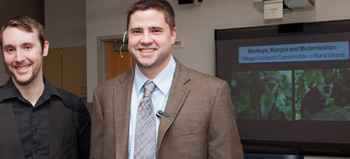Monkeys, Mangoes and Modernization
Professor unveils taboos of African monkey sanctuary

A Guenon monkey
When most people imagine visiting a wildlife sanctuary in Africa, they picture going to a large park with guided Jeep tours that drive around watering holes surrounded by lions, gazelles and elephants.
Few people might imagine a small agrarian village without an elephant to be seen—but where monkeys regularly pour out of the forest to chew on the residents’ homes and steal food from their kitchens.
Clark College anthropology professor Rob Schubert, Ph.D., calls this latter form of sanctuary a “sacred grove,” and he shared his experiences studying one such grove during a Faculty Speaker Series presentation in February.
Schubert spent 10 months studying the Boabeng Fiema Monkey Sanctuary (BFMS) in Ghana, West Africa. This is a loosely connected collection of forested land that sits near the villages of Boabeng and Fiema, where monkeys are protected by a web of cultural and religious taboos against harming them.
Schubert said the origins of these taboos are a little hard to trace, but the end result has been that the two species of monkey inhabiting the BFMS—the ursine colobus and the Lowe’s guenon—are considered sacred. Most villagers consider it sinful to kill or harm them, a belief which has been codified into law. This is a drastic difference from the treatment of monkeys in many other parts of the world, where they are often under threat from logging, agriculture, the bushmeat trade, the black market for “exotic” pets and the tourist-craft industry.
Schubert reported that 90 percent of primate species worldwide are dependent on endangered habitat; 25 percent of primate species are considered threatened.
[quote style=”boxed”]“These animals are under threat and disappearing at an alarming rate.” ~ Prof. Rob Schubert[/quote]“These animals are under threat and disappearing at an alarming rate,” Schubert said. Because of this, studying sacred groves like the BFMS, where monkey populations are actually increasing instead of decreasing, is vitally important to learning how to preserve primate species.
Schubert’s research showed that the sacred grove model had potential to help both its primate and its human residents. The monkeys enjoyed relative safety and freedom while many villagers gained revenue from the ecotourism trade.
On the other hand, because other wildlife does not share the protected status of the monkeys, non-monkey species have been hunted almost to extinction within the forest, creating an unbalanced ecosystem.
And as monkey populations increase, their forays into the local villages to look for food have become more stressful for villagers. The ursine colobus chew on villagers’ huts in an effort to get minerals from the construction materials, while the Lowe’s guenons aggressively search for any kind of food they can find—going so far as to steal food right from the residents’ cooking fires.

Student Tyler Kellett, left, credits Rob Schubert with getting him interested in anthropology.
Still, Schubert said he thought sacred groves could be a successful way to preserve threatened wildlife, especially if the ecotourism market began incorporating them into its travel itineraries. “As global tourists … we have the responsibility to not just go to the sites that are easy for us,” he said.
Schubert has taught anthropology at Clark since 2011 and became department chair in fall 2012. He received his bachelor’s degree at the University of Illinois and both his master’s and doctorate at The Ohio State University in Columbus. In his introductory remarks at the lecture, Vice President of Instruction Tim Cook, Ph.D., called him “a passionate and inspiring educator.”
After the event, Lorraine Leedy, Teaching & Learning Center coordinator said, “I am so pleased with the outcome of Dr. Schubert’s presentation. He drew a mixed audience of students, faculty, staff and community members … We have fantastic, motivated instructors here. This series provides an opportunity for everyone to share the high-quality education we offer.”
The Clark College Faculty Speaker Series showcases recent experiences that have enriched both the life and teaching of a Clark faculty member. Faculty members share their experiences with the college community— and members of the community at large—while addressing some of today’s most intriguing issues. Established by Clark College with support from Clark College Foundation, the series honors individual faculty members and celebrates academic excellence.

